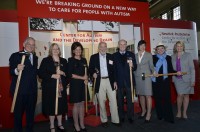Autism Advocates Cheer New Center in White Plains

Construction has officially begun on an autism center in White Plains that could change the way the condition is viewed and treated.
New York-Presbyterian Hospital celebrated the start of construction on the new Center for Autism and the Developing Brain at the Hospital’s Westchester campus in White Plains on Wednesday.
Developed in collaboration with the New York Center for Autism, the 11,000-square-foot facility is slated to open in early 2013. The center’s mission is to provide cutting-edge research, education, and comprehensive services to people with autism spectrum disorders at every stage of life, from infancy through adulthood.
The center will arrive on the scene at a time when autism is on the rise. According to the Centers for Disease Control and Prevention, autism affects 1–1.5 million American children and adults. That means one in 88 children — the majority of them boys — have been diagnosed with autism. The cause of this increase has not been determined.
Autism advocates and medical professionals praised the center as a place where families can get treatment and people with autism can still flourish.
“For families, receiving an ASD diagnosis for their loved one can be overwhelming and often they don’t know where to turn for help,” says Dr. Steven J. Corwin, CEO of New York-Presbyterian Hospital. “The Center for Autism and the Developing Brain will be an incredible partner for parents and caregivers as they seek the very best care for their child with an autism spectrum disorder.”
The center will help families connect with programs and services in their community, and each patient will have his or her own treatment program, uniquely suited to their needs.
“By evaluating the strengths and weaknesses of each patient, and by monitoring and measuring that individual’s response to a variety of approaches, we will fine-tune our ability to deliver the best possible short-term treatments while linking patients and their families to existing resources in their communities,” Dr. Catherine Lord, a leading autism authority and the center’s director, said. “Diagnosis is just a start.”
Dr. Lord’s vision for the center is based on a personal desire to help families of children with autism understand the disorder, as well as their child’s strengths and weaknesses. The center will also create a supportive physical environment in which individuals and families can flourish. The design of the new facility supports this purpose, with an open, light-filled space organized around a “village” theme.
Rooms can be identified by their color — an autism-friendly approach to design — and soft carpeting and soundproofing prevents noise reverberation. The entire space will communicate openness and flexibility through the use of natural light, architectural flow, and an “open-door policy.”
Ilene Lanier, one of the leaders of the New York Center for Autism, which spearheaded the center, said this center fills a huge void for area residents dealing with autism.
“A place like this doesn’t exist in most places,” Lanier said. “You have to hop, skip and jump to see different doctors who don’t speak to each other. The center will help families chart their course for treatment.”
Lanier said that because of the center, families would have access to treatments that aren’t widely known, and will receive the most cutting age and innovated care.
“To have a resource like this is huge,” Lanier, a mother of an autistic child, said. “This will not only serve the area, but they can develop a model replicated elsewhere in the county.”
Lanier said one of the reasons she helped start the New York Center for Autism was because of the lack of services for families in the New York Metro Area. She said she was filled with glee at the groundbreaking ceremony.
“I am thrilled, I couldn’t be happier,” Lanier said. “Families who receive the diagnosis will be given the help they need that didn’t exist before. Autism is terrible and painful for any parent for their child; what is more painful is not knowing how to help them. This center will address that.”

Adam has worked in the local news industry for the past two decades in Westchester County and the broader Hudson Valley. Read more from Adam’s author bio here.
